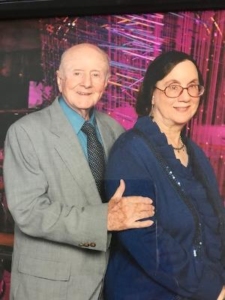Donor Spotlight
Virginia Barrett and her husband Conrad have been dedicated ARCE members for decades, supporting both the ARCE Orange County Chapter lectures and ARCE’s ongoing Egyptological projects. We are honored that Virginia has shared her experience with ARCE, and her lifelong interest in Egyptology as part of our Donor Spotlight Series.
For the Love of Egypt and ARCE
by Virginia Barrett, Cypress, California
 For the past 25 years, my husband and I have had the pleasure of attending monthly lectures of the Orange County, CA Chapter of ARCE held at the Bowers Museum in Santa Ana.
For the past 25 years, my husband and I have had the pleasure of attending monthly lectures of the Orange County, CA Chapter of ARCE held at the Bowers Museum in Santa Ana.
My interest in all things Egyptian began in middle school when I found an illustrated children’s book called A Camel for a Throne by Eloise Lownsbery at the library. The novel drew me to more books on the culture, stories, myths, and history of Egypt. I had discovered a highly mythopoetic culture that spoke to me in metaphors and symbols, the language of the soul. The myths were multi-faceted gemstones polished by the passage of time. The mysteries of life and death were boldly presented in elaborate stories, rituals, and art.
When I was in high school, I started a neighborhood study group for kids. We sewed our own costumes and met once a week on my family’s patio to learn the myths and stories of Egypt. There were rituals, art projects and even a home-made tarot deck for fortune telling. The boys took the names of gods or pharaohs, the girls were named for queens or goddesses. Even my cat, Khemi, wore a collar and tin foil earrings. After seeing the movie “Cleopatra” with Elizabeth Taylor, we were inspired to make a home movie of the Osiris and Isis myth. We created film sets in my backyard and shot scenes on location in Balboa Park and Mission Valley in San Diego. We corresponded with each other in English using a hieroglyphic alphabet.
I went on to study ancient history and three years of Latin in high school. I majored in English and Latin in college and took a master’s degree in the teaching of Latin at the University of Massachusetts at Amherst. For thirty years I served as a founding member, editor, Treasurer, and then Chair of the American Classical League’s National Committee for Latin and Greek, which promotes the study of classical languages from elementary school through university level (www.promotelatin.org). Following our two trips to Egypt, I wrote a collection of fifty poems called Sandals: A Journey from Aswan to Alexandria to keep the places we visited vivid in my memory.
My husband, Conrad Barrett, received a doctorate in Classics at the University of Southern California. He went on to become a Classics Professor at Cal State University, Long Beach where he developed some large enrollment courses to help fund the smaller classes in ancient Greek and Latin languages. The Classics program has grown from a faculty of two to six professors and lecturers.
Thanks to ARCE and the ARCE Orange County chapter, we have attended ARCE Annual Meetings, and learned from noted speakers at chapter events who are engaged in excavation, conservation, and restoration projects. The lectures transport the audience, and it is as if we are on site as new discoveries are made.
At times, we helped sponsor chapter speakers with the privilege of meeting and having lunch with the speaker and local ARCE board members. Scribe magazine helps us stay abreast of recent discoveries, exhibits, and research in Egyptology.
We have become ARCE members and donors to help fund needed training programs for future Egyptologists and the ARCE sponsored excavations and restoration projects. We are also including ARCE in our estate plan.
We thank ARCE and all ARCE Chapter speakers and officers for giving us the opportunity to visit their archeological sites through their lectures, and to learn more about the history, art, and culture of ancient Egypt.